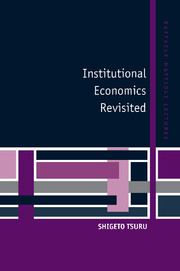Book contents
- Frontmatter
- Contents
- Preface
- Institutional Economics Revisited
- CHAPTER ONE Reappraisal of Marxian Political Economy as ‘Institutionalism’ in the Broad sense of the Term
- CHAPTER TWO The Methodology of Aggregates: Keynes vs. Marx
- CHAPTER THREE Marx vs. Schumpeter on Business Cycles
- CHAPTER FOUR Institutional Economics in America: Veblen
- CHAPTER FIVE Modern Institutionalism
- CHAPTER SIX The Future of Institutional Economics I: In Place of GNP
- CHAPTER SEVEN The Future of Institutional Economics II: The Mixed Economy as a Mode of Production
- DISCUSSION, AND COMMENTS, BY SHIGETO TSURU
- BIOGRAPHY OF SHIGETO TSURU
- References
- Index
CHAPTER FOUR - Institutional Economics in America: Veblen
Published online by Cambridge University Press: 13 May 2010
- Frontmatter
- Contents
- Preface
- Institutional Economics Revisited
- CHAPTER ONE Reappraisal of Marxian Political Economy as ‘Institutionalism’ in the Broad sense of the Term
- CHAPTER TWO The Methodology of Aggregates: Keynes vs. Marx
- CHAPTER THREE Marx vs. Schumpeter on Business Cycles
- CHAPTER FOUR Institutional Economics in America: Veblen
- CHAPTER FIVE Modern Institutionalism
- CHAPTER SIX The Future of Institutional Economics I: In Place of GNP
- CHAPTER SEVEN The Future of Institutional Economics II: The Mixed Economy as a Mode of Production
- DISCUSSION, AND COMMENTS, BY SHIGETO TSURU
- BIOGRAPHY OF SHIGETO TSURU
- References
- Index
Summary
It is generally agreed that American institutionalism was ‘born’, so to speak, with the impact given by Thorstein Veblen (1857–1929). Leon Ardzrooni, who edited Veblen's Essays in Our Changing Order, 1934, wrote in his Introduction:
Veblen was in reality one of those rare men who may be said to have been ahead of his time – ahead in the sense that what he said and thought was destined to be accepted by succeeding generations though they were rejected by his own generation. ‘Hence, he was lonely as an alien can be.’
Also, Wesley Mitchell (1874–1948) wrote shortly after Veblen's death, referring to the influence of that ‘disturbing genius’: ‘no other such emancipator of the mind from the subtle tyranny of circumstance has been known in social science, and no other such enlarger of the realm of inquiry’.
In spite of these laudatory words by his disciples, Veblen, along with American institutionalism, appears to have been either pushed into oblivion- or regarded as unworthy in the current atmosphere of American academic circles. Paul Samuelson, for example, in the 12th edition of his standard textbook {Economics, 1985), omitted entirely a reference to institutionalism; and Robert Kuttner, in a recent contribution to The Atlantic Monthly, wrote:
A generation ago economics was far more committed to observation, disputation, and its own intellectual history. The lions of the midcentury had lived through depression and war, had watched real economic institutions totter, had worked in economic agencies, and had appreciated the power of statecraft. Most of them are now gone. In the 1920s and 1930s an eclectic school of economics known as institutionalism flourished. […]
- Type
- Chapter
- Information
- Institutional Economics Revisited , pp. 59 - 70Publisher: Cambridge University PressPrint publication year: 1993

